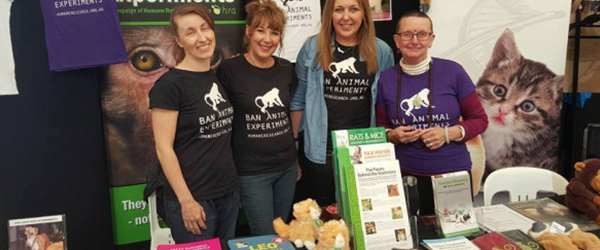
Animal-based research and a plant-based diet – the links
April 24th, 2017Guest blogger Helen Marston is Chief Executive Officer of Humane Research Australia (HRA). She has been with HRA since the start of 2005, and prior to that worked for Animals Australia and produced a TV program about animal welfare and rights issues. Founded in 1979, HRA is an Australian not for profit organisation that challenges the use of animals experiments and promotes the use of more humane and scientifically valid non-animal methods of research.
In this post, originally posted on her blog, Helen discusses her work to end animal-based research and the connections with promoting a plant-based diet. In New Zealand, the issue is much the same, as animal research is a global issue. As well as a relatively small amount of medical research (about 10% of animal used in research in NZ are for medical purposes) there is a considerable amount of animal experimentation to increase the productivity, and profitability, of animal agriculture industries.
There are two things I am incredibly passionate about. Obviously, I care deeply about the use of animals in cruel experiments, but I am also equally passionate about promoting a vegan lifestyle.
Working for Humane Research Australia it has been necessary to focus on the one issue – animal experimentation – and I have never allowed my second passion to impact or interfere with our main objective, except that any event that HRA caters for is entirely vegan. That, however, is due to my uncompromising ethics rather than it being a HRA policy. I have – somewhat reluctantly – excluded veganism from our core work as it was outside the scope of our organisation’s constitution.
There have been three things I have seen lately that have convinced me that the promotion of veganism – or rather, a healthy plant-based diet – is clearly intertwined with our stance on animal experimentation.
Consider the vast amounts of money – much of it our taxes – poured into medical research, (including animal experiments) every year in an attempt to find cures to chronic illness. What if, instead of using such huge resources to seek cures, it was used to educate for the prevention of these ailments? As the old saying goes, prevention is better than cure, and surely, surely, far more people’s health would be improved, lives would be saved and healthcare costs drastically reduced if we avoided chronic illness – diabetes, atherosclerosis, high blood pressure and many cancers – in the first place.
And speaking of healthcare costs, if these were reduced there would be more resources available to find cures for those ailments which are genetic and not preventable through lifestyle changes.
A previous blog of mine, A Vicious Circle, goes into this in more detail.
It sounds a bit too simple, doesn’t it? That’s because there is more to it than simply improving health. Consider the pharmaceutical companies whose profits depend on ongoing treatments rather than cures (healthy people do not provide a profit). Consider the researchers who must continue publishing papers in order to secure further grants – many of these papers which involve animal experiments. And consider the huge market in producing animals as proxies for humans in invasive research. We could be forgiven for thinking that animal experimentation, and indeed much medical research, continues not to improve human health, but rather because it represents big business! But what is more important? Providing careers for young researchers or actually improving the health of our population?
The three things I mentioned earlier are:
How not to die – a fascinating book by Dr Michael Greger that discusses foods scientifically proven to prevent and reverse disease.
What the Health – recently premiered in Melbourne to a sellout audience, this film takes a critical look at our healthcare system.
Serving Love – a health and wellness documentary I purchased recently which focuses on the benefits of a raw, plant-based diet.
These three resources, backed up with scientific evidence, will leave you in no doubt about the importance of wholefoods to our health and wellbeing. I strongly recommend each of them to you.
With many people questioning the causes of the poor state of health of today’s population, Dr Michael Klaper, who features in two of the above resources, puts it quite simply –
“It’s the food. It was always the food.”
Yet we continue to ignore the serious implications of this basic concept and instead pump billions of dollars into the research and healthcare industries, subject millions of animals to cruel experiments every year and deny those people with chronic illness a chance of living healthily. So clearly, there is indeed a clearly-established link between public health and the promotion of a plant-based, wholefoods diet.
There are so many areas of animal experimentation and HRA will continue to focus on that specifically, but it is essential that we work in collaboration with other groups that promote healthy living through a plant-based wholefood lifestyle in order to reach our shared goal – the elimination of chronic disease and the promotion of a healthy society.
For more information:
